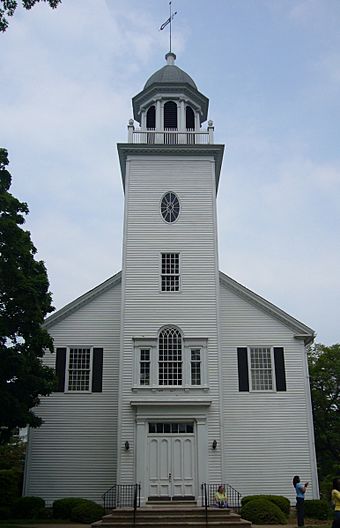Orange Center Historic District (Orange, Connecticut) facts for kids
Quick facts for kids |
|
|
Orange Center Historic District Church
|
|

Orange Congregational Church
|
|
| Location | Roughly Orange Center Rd. from Orange Cemetery to Nan Dr., Orange, Connecticut |
|---|---|
| Area | 195 acres (79 ha) |
| Built | 1810 |
| Architect | Hoadley, David |
| Architectural style | Greek Revival, Late Victorian, Federal |
| NRHP reference No. | 89001089 |
| Added to NRHP | August 10, 1989 |
The Orange Center Historic District Church is a special area in Orange, Connecticut. It shows what a small town center looked like in the 1800s. Even though the area around it has grown a lot, this district has kept its old-fashioned charm. It became a local historic district in 1978 and was added to the National Register of Historic Places in 1989. This means it's officially recognized as an important historical place!
Exploring Orange Center's Past
Orange was once part of Milford. People first settled here in the late 1600s. Over the 1700s, it grew as a collection of farms. In 1791, a common area was set aside. Part of this area is now the town green.
A church group was allowed to form in 1804. This led to the building of the beautiful church you see today. Orange officially became its own town in 1822. The town center didn't grow very fast because big roads and transportation routes didn't pass through it. This helped it keep its historic look.
Key Buildings in the District
The Orange Congregational Church is a main building in the district. It was designed by David Hoadley and built in 1810. This church has a style called Federal style. You can see a special "Palladian window" and a cool domed tower.
The district also includes other important buildings:
- The Stone-Otis House was built around 1830. It shows a mix of Federal and Greek revival styles. Today, it is a museum where you can learn about the past.
- The Academy is an old schoolhouse built in 1878. It has unique "stick style" details, like fancy designs on its gables. It is also a museum now.
These buildings show different types of old architecture. You can see Greek Revival, Late Victorian, and Federal architecture styles. They help tell the story of Orange's history.
 | Dorothy Vaughan |
 | Charles Henry Turner |
 | Hildrus Poindexter |
 | Henry Cecil McBay |



